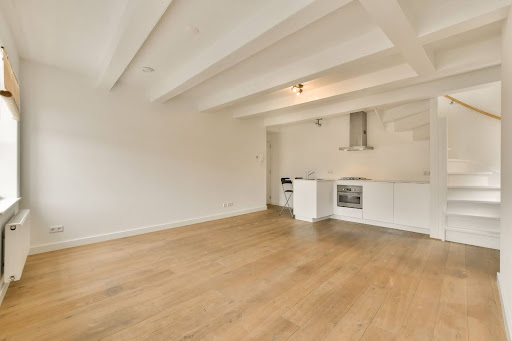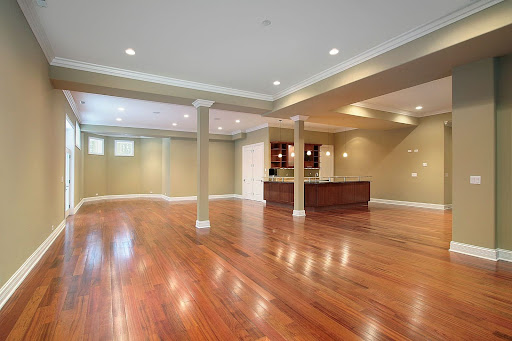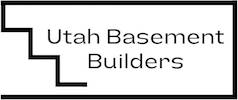Welcome to our in-depth exploration of basement flooring options! When it comes to finishing or remodeling your basement, choosing the right flooring is a crucial decision that significantly impacts the functionality and aesthetic appeal of the space.
Basements present unique challenges, from moisture control to durability requirements, making the choice of flooring a pivotal part of your renovation journey.
In this comprehensive guide, we’ll delve into the pros and cons of various basement flooring options suited for basements. Whether you’re transforming your basement into a lively family room, a personal gym, or a sophisticated home office, the right flooring will elevate your space to its full potential.
So, let’s embark on this journey to discover the perfect flooring solution for your basement transformation!
4 different basement flooring options
1. Concrete flooring
Concrete flooring is a popular basement option because it is durable and versatile. Here are the pros and cons of choosing concrete flooring for a basement:
Pros:
Durability: Concrete floors are extremely durable and are able to withstand heavy foot traffic, impacts, and weight. This makes them ideal for basements used as recreational areas, workshops, or storage spaces.
Low maintenance: Concrete is easy to clean and maintain. Regular sweeping and occasional mopping are usually sufficient to keep it in good condition.
Moisture resistance: Being impervious to water, concrete is an excellent choice for basements prone to dampness and occasional flooding.
Longevity: A well-maintained concrete floor will last decades without needing replacement, making it a cost-effective long-term flooring solution.
Customizable: You can stain, paint, or seal concrete with various finishes, allowing for a range of aesthetic options from sleek and modern to rustic and textured.
Energy efficiency: Concrete has thermal mass properties, which means it absorbs and retains heat, potentially helping to regulate the temperature in a basement.
Cons:
Hard and unforgiving surface: Concrete is extremely hard and uncomfortable to stand on for extended periods. It’s also unforgiving on dropped items and may not be the best choice for play areas.
Coldness: Concrete floors are cold underfoot, which may not be desirable in a living space, especially in colder climates.
Moisture accumulation: While water-resistant, concrete allows moisture to accumulate underneath if not properly sealed, potentially leading to mold or mildew issues.
Aesthetic limitations: Some may find the look of concrete too industrial or stark, although you can mitigate this with various finishing techniques.
Installation and repairs: Pouring a new concrete floor requires professional installation and gets expensive. Repairing concrete is also challenging if it cracks or gets damaged.
Sound Amplification: Concrete echoes and amplifies sounds, which might be a consideration if the basement is used as a living or entertainment space.
2. Ceramic tile
Ceramic tile is another popular basement flooring choice, combining durability and aesthetic appeal. Here are its pros and cons:
Pros:
Water resistance: Ceramic tiles are highly resistant to water and moisture, making them an excellent choice for basements prone to dampness or occasional flooding.
Durability: They are tough and long-lasting, able to withstand heavy foot traffic, and resist wear and tear over time.
Low maintenance: Ceramic tiles are easy to clean and maintain. Regular sweeping and mopping are sufficient to keep them looking new.
Variety of styles: Available in a wide range of colors, patterns, and sizes, ceramic tiles offer versatile design options to suit any decor style.
Hygienic: The surface of ceramic tiles does not attract dust, pollen, or other allergens, making it a good flooring option for those with allergies.
Adds value to property: Well-installed, high-quality ceramic tile flooring adds aesthetic and monetary value to your home.
Cons:
Cold and hard: Like concrete, ceramic tiles are cold underfoot, which might be uncomfortable in a basement setting without proper heating. They are also hard, which is uncomfortable for standing for long periods and risky for breakable items.
Slippery when wet: Ceramic tiles become slippery when wet, which is a safety concern, especially if there are children or elderly residents in the home.
Installation Process: Installing ceramic tiles is labor-intensive and requires precision. It’s usually not a DIY-friendly option and requires professional installation.
Grout maintenance: While the tiles are low maintenance, the grout between them often becomes dirty or stained and may require regular cleaning or resealing.
Potential for cracking: Ceramic tiles can crack if a heavy object is dropped on them, and repairing a cracked tile is challenging.
Cost: High-quality ceramic tile is expensive in terms of the material and installation cost.

3. Vinyl flooring
Vinyl flooring is a versatile and popular choice for basements due to its durability and range of styles. Here are the pros and cons of using vinyl flooring in a basement:
Pros:
Water resistance: Vinyl is highly resistant to moisture, making it an ideal choice for basements that are prone to dampness or occasional water issues.
Durability: Quality vinyl flooring is durable and withstands heavy foot traffic, making it suitable for a frequently used basement.
Comfort: Unlike hard surfaces like concrete or tile, vinyl flooring is softer underfoot, providing a more comfortable walking and standing experience.
Ease of installation: Vinyl flooring is easier to install than many other types of flooring. Some types, like luxury vinyl planks (LVP) or tiles (LVT), come with click-lock installation systems that don’t require adhesives.
Variety of styles: Available in a wide range of colors, patterns, and designs, vinyl mimics the look of more expensive flooring like hardwood or ceramic tile.
Affordability: Generally, vinyl flooring is more affordable than many other flooring options, offering a good balance of cost and performance.
Low maintenance: Vinyl is easy to clean and maintain, requiring only regular sweeping and occasional mopping.
Cons:
Susceptibility to damage: While durable, it’s possible to puncture or tear vinyl with sharp objects. It can also get damaged under extremely heavy furniture.
Not as valuable as other floors: While vinyl is aesthetically pleasing, it doesn’t add as much value to a property as natural materials like wood or stone.
Potential for VOC emissions: Lower-quality vinyl flooring may emit volatile organic compounds (VOCs), especially when new. However, many manufacturers now offer low-VOC or VOC-free options.
Subfloor requirements: Vinyl flooring requires a smooth, even subfloor. Any bumps or gaps might telegraph through the vinyl, affecting its appearance and durability.
Environmental impact: Vinyl is a synthetic material and is not biodegradable. It’s also not always recyclable, which is a concern for environmentally conscious homeowners.
Temperature sensitivity: Some types of vinyl flooring are susceptible to damage from extreme temperatures, which might be a consideration in unheated basements.

4. Engineered wood
Engineered wood is a popular flooring choice for basements due to its natural wood appearance and improved stability compared to solid hardwood. Here are the pros and cons of using engineered wood as basement flooring:
Pros:
Moisture resistance: Engineered wood is more resistant to moisture and humidity changes than solid hardwood due to its construction, making it a suitable option for basements.
Natural wood appearance: It provides the warmth and elegant appearance of real wood, which many homeowners desire.
Stability: The layered construction of engineered wood reduces the risk of warping or bowing, common issues in solid hardwood floors when exposed to moisture.
Compatibility with underfloor heating: Unlike solid hardwood, many engineered wood floors are compatible with underfloor heating systems, which is a significant advantage in a basement setting.
Ease of installation: You can install engineered wood on top of concrete. It often comes with click-lock systems, making it easier to install than traditional hardwood.
Variety of finishes and styles: It is available in a wide range of finishes, styles, and wood species, allowing for versatile design choices.
Cons:
Cost: Engineered wood is more expensive than some other flooring options like vinyl or laminate, though it is generally less costly than solid hardwood.
Limited refinishing options: While you can sand and refinish it, the number of times this is possible depends on the thickness of the top wood layer, which is less than that of solid hardwood.
Potential for damage: Engineered wood is still susceptible to scratching and, if exposed to significant amounts of water, may suffer damage.
Not completely water-proof: While more resistant to moisture than solid wood, it is not completely waterproof. Prolonged exposure to water leads to damage.
Sensitivity to temperature and humidity fluctuations: Although more stable than solid hardwood, engineered wood can still be affected by extreme changes in temperature and humidity.
Environmental concerns: Some engineered wood products may contain adhesives and glues that release volatile organic compounds (VOCs), though many manufacturers now offer low-VOC options.
Basement flooring with Utah Basement Builders
With these basement flooring options in mind, it’s time to bring your vision to life, and Utah Basement Builders is here to help you every step of the way. Our team of skilled professionals is dedicated to ensuring that your basement flooring looks fantastic and is perfectly suited to your needs and the unique challenges of basement environments.
At Utah Basement Builders, we understand that every basement is unique, and so are your preferences and requirements. That’s why we offer personalized consultations to help you choose the best flooring option for your space.
Whether you’re drawn to the natural elegance of engineered wood, the practicality of vinyl, or the sleek look of concrete, we have the expertise to install it flawlessly.
Take the first step towards your ideal basement today. Contact Utah Basement Builders for a consultation, and let’s turn your basement flooring ideas into a beautiful and lasting reality. Your dream basement awaits, and we’re excited to help you create it!
toto slot toto slot slot thailand situs slot gacor toto togel toto slot slot online situs toto situs togel